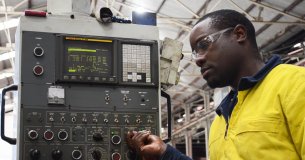-
Featured Items
-
Featured Resources
 Funding & Grants
Don't miss out on funding opportunities. Stay informed with our up to date online listings and email notifications.
Read More
Funding & Grants
Don't miss out on funding opportunities. Stay informed with our up to date online listings and email notifications.
Read More
 Skilled Migration
Our services help both applicants and employers, to learn more, develop plans, submit applications, and settle in.
Read More
Skilled Migration
Our services help both applicants and employers, to learn more, develop plans, submit applications, and settle in.
Read More
 Research and Analysis
Good research and analysis makes the case. How can our resources and services help your project or application?
Read More
Research and Analysis
Good research and analysis makes the case. How can our resources and services help your project or application?
Read More
 Information & Data Resources
With resources like REMPLAN, Regional Knowledge Base, and decades of data, discover how we can help your project.
Read More
Information & Data Resources
With resources like REMPLAN, Regional Knowledge Base, and decades of data, discover how we can help your project.
Read More
-
Stay InformedSubscribe to one or more of our regular email subscriptions, to be kept up to date on news and funding opportunities for the region
-
-
Our Region
- Our Region
- Regional Plan
- Regional Data
- Current Regional Issues
- Population Migration Analysis for 2016-21
- Job Vacancies Continue at All-Time High
- National Debt - What it Means for Our Economy?
- The True Value of Home Solar
- The Economic Impacts of Local Government Amalgamations
- State of the Regions Report 2014-15
- Antifragility - A different take on regional economic development
- Biohubs - Collaborative Waste Management
- Attracting New Residents
- Socio-Economic Impacts of the Murray Darling Basin Plan
- Murray Darling Basin Water Recovery
- Growing Businesses
- The Northern Inland Economy
- Geographical Overview
- Major Industry Sections
- Our Services
- Grants and Funding
-
Skilled Migration
- Skilled Migration
- Skilled Employer Sponsored Regional Visa
- Skilled Work Regional Visa (subclass 491)
- Temporary Seasonal Workers
- Designated Area Migration Agreement (DAMA)
- Helpful Information for Visa Holders
- Information for Employers
- Case Studies
- Payment Details
- Advice & Further Information
- Contact Details
- News & Events
-
Our Projects
- Our Projects
- Current Projects
- Skilled Migration
- Wool Works - Wool Training Schools
- Metal Works - Welding and Fabrication Schools
- Come On Inland
- Stories of Resilience
- Alt Brothers Beekeeping - Glen Innes
- Carelle's Toy Store - Glen Innes
- Greenhill Orchards - Arding
- Gwydir Meats - Warialda
- Kaputar Motors - Narrabri
- Moonbi General Store - Moonbi
- Sandstock - Tingha
- Sherelle Fashions - Tenterfield
- Sleepy Merino - Inverell
- Tenterfield Chamber of Toursim, Industry and Business - Tenterfeild
- The Welders Dog - Armidale
- Walcha Veterinary Supplies - Walcha
- AGCAP - Agribusiness Careers & Professions
- Northern Inland Regional Investment Profile
- Past Projects
- Digital Economy Strategy
- Business Growth Project
- Go Digital
- How to Start an Online Business
- Create Your Website Using Squarespace
- How to Edit Your Squarespace Site - Part 1
- How to Edit Your Squarespace Site Part 2
- Add a Shop to Your Squarespace Site
- Start a Blog and Find out What Customers are Searching
- 14 Tips For a Better Blog Post
- Which Social Media Platforms are Best for Your Business
- How to Use Facebook Effectively For Your Business – Part 1
- How to Use Facebook Effectively For Your Business – Part 2
- Instagram Tips for Business
- Catching Up, More Instagram & Dealing with Haters
- Getting Started with Twitter for Business
- Social Media Scheduling Tools
- How to Start an Etsy Shop – Part 1 – Research
- How to Start an Etsy Shop – Part 2 – Signup
- Online Security for Your Business
- Product Photography and Website Images: Your Guide
- 5 Tips to Improve your Productivity in your Business
- Best Online Business Resources
- How to Improve Your Communication Skills and Win More Clients
- NBN Coordinator
- Putting Power Back in the Regions
- Road Freight Study
- Town Audit Benchmarks
- Food and Wine
- Youth Survey
- Digital TV Switchover Assistance
- Northern Inland Transport Guide
- Live.Train.Work
- Northern Inland Innovation Awards
- Northern Inland Innovation Awards - 2017
- Northern Inland Innovation Awards - 2016
- Northern Inland Innovation Awards - 2015
- Northern Inland Innovation Awards - 2014
- Northern Inland Innovation Awards - 2013
- Northern Inland Innovation Awards - 2012
- Norther Inland Innovation Awards - 2011
- Prime Super Northern Inland Innovation Awards - 2010
- Prime Super Northern Inland Innovation Awards - 2009
- Northern Inland Innovation Awards - 2007
- Northern Lights Project
- NBN Smart Home
- Murray Darling Basin
- Moree Plains Business Workshops
- Namoi Investment Prospectus
- Industrial Land
- Bioenergy and Local Electricity Retailing
- Northern Inland Business Energy Assessment
- Skills for the Future
- Impacts of COVID-19 on Businesses
- Past Projects of NIRDB
- Aboriginal Employment and Enterprise in the Gunnedah Region
- Art as an Industry
- Aviation Survey
- Farm Forestry - Northern Inland Forestry Investment Group
- New England North West Film Strategy
- Northern Inland Excellence in Business Awards
- Food and Wine 2003 - 2008
- Prime Super Northern Inland Innovation Awards 2009
- Regional Business Networking Program
- Regional Leadership Course 2008
- Viticulture Strategy 2002-2003
- About Us
- Contact Us
- Other Resources
- Privacy and Legal
- Search
- News & EventsNews & Events
- NewslettersNewsletters
- Covid-19 Northern Inland business ImpactsCovid-19 Northern…
Back to Newsletters
Covid-19 Northern Inland business Impacts
Tuesday 19th of May 2020
A Regional Development Australia Northern Inland (RDANI) survey has gathered cold hard facts and figures to paint a clear picture of the stark Covid-19 reality for local businesses. “The unprecedented pandemic measures which ripped out over 5,000 full-time equivalent jobs (an estimated 7,500 jobs including part-time and casual positions) from our economy, followed a horror bushfire season and the worst drought ever recorded in our region. Our Northern Inland NSW Covid-19 business impacts survey had almost 200 participants and we are grateful for everyone’s input,” said RDANI Chair Russell Stewart.
“RDA Northern Inland’s Finance and Project Officer Rebecca Wright and Economist James Pryor spent many hours creating and analysing this survey. The data they have provided shows just how big a hit our economy has taken and how business owners have managed their costs. This is critical for appreciating and shaping the re-growth battle ahead.”
“Regional Australia might expect a tougher, slower recovery than our big cities because the triple whammy we’ve faced and economic dependence on the agricultural sector, which has seen relatively little assistance in comparison. Yet, our resilience and community spirit has been tried and proven. Drought recovery requires significant reinvestment and does not happen overnight but our agribusinesses have been enjoying their best conditions in years and that will help with the confidence we need across the board to recover from Covid-19 restrictions.”
RDA Northern Inland Economist James Pryor said some preliminary data from the region-wide Covid-19 business survey has already been conveyed to the Federal Government. “RDANI, together with representatives of regions around the country is taking part in regular teleconferences with Assistant Minister for Regional Development and Territories, the Hon. Nola Marino, as well as senior Government officials from the Departments of Regional Development and Treasury. The Government is certainly getting the latest on how our region is managing this crisis.”
“The most directly impacted businesses by Covid-19 restrictions and therefore the most common in our survey, were hospitality, service and retail enterprises. However, the impacts have dramatically flowed on, across all sectors. Whether impacted directly or indirectly, more than three-quarters of local businesses have taken a moderate hit or worse. There was a quarterly downturn of 50 percent for half of the survey participants and 67 percent do not have enough income to cover operating costs. We also saw that three out of four would have coped with the pandemic better had they not already endured tough times due to drought and bushfires.”
Mr. Pryor said that two points were of particular interest to governments. “Particularly in relations to manufacturing, more than one-third of businesses have been considerably reduced by their inability or limited capacity to import or export. In hospitality and retail, commercial rent was discussed by Federal and State Governments early in the Covid crisis and the onus for a sustainable approach was left up to the businesses and their landlords to negotiate. Our survey showed that 27 percent negotiated a special agreement but 10 percent tried and failed.”
The Covid-19 crisis saw policies rolled out rapidly and many employers have admitted to not keeping up to date on changes in employment law, awards and occupational health and safety. “Our Governments are being thorough in getting a great deal of information out to the public as quickly as possible. It is important that local businesses observe Covid-19 or general business regulations from appropriate Government websites and not via social media.”
“There has been a general build-up of debt, as tertiary industries struggled to meet costs and retain staff in the face of dramatically reduced or completely halted income. This will handicap or prolong Covid-19 recovery for many.”
“Invaluable insights from business people concerning Government support and recovery needs were received. However, in general, Northern Inland businesses approve of the Federal and State Government’s handling of the Covid-19 crisis and most report that the situation for them and their employees would have been far more desperate without the JobKeeper program,” Mr. Pryor summarised.
The survey data and a concise analysis can be found on the RDA Northern Inland website: http://www.rdani.org.au/projects/covid19-impacts-on-businesses.php
Related Pages







 Latest News
Latest News

